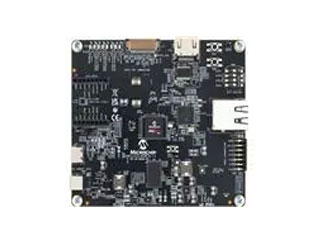

Microchip PIC64GX 64-bit RISC-V® Quad-Core Microprocessor
Scalable computing at the intelligent edge
The PIC64GX MPU family by Microchip, designed to meet the growing demand for mid-range intelligent edge computing, is powered by a 64-bit RISC-V® quad-core processor. The microprocessors deliver exceptional performance with asymmetric multiprocessing and deterministic latencies.
Its configurable processor and memory subsystem ensure robust security, including secure boot and key management, meeting military-grade standards. Additionally, the five-stage in-order pipeline architecture is resistant to Meltdown and Spectre vulnerabilities, providing peace of mind in secure applications.
Fully pin-compatible with PolarFire® SoC FPGAs, the PIC64GX is an ideal solution for customers looking to build power-efficient, embedded compute platforms.
Features
CPU Core Architecture
| Extensive Connectivity
| Ample Flexible Memory
|
Asymmetric Multiprocessing
| Defense-Grade Security
| Comprehensive Tool Suite
|
PIC64GX MPU Architecture

PIC64GX1000 Devices
PIC64GX1000/FCS
| PIC64GX1000/FCV
|
Deterministic Asymmetric Multiprocessing (AMP) Linux Applications
Safety-critical, system control and security applications need the flexibility of the Linux OS and the determinism of real-time systems to control hardware. Typical Symmetric Multiprocessing (SMP) implementations may offer the flexibility of a rich operating system but are terrible for running real-time systems that need deterministic performance.
PIC64GX MPUs feature a multi-core Linux OS-capable processor that is coherent with the memory subsystem, allowing a versatile mix of deterministic real-time systems and the Linux OS in a single multi-core CPU cluster. PIC64GX MPUs enable you to create high-performance and hard real-time AMP systems that execute on time.
PIC64GX Curiosity Evaluation Kit
The Curiosity PIC64GX1000 Kit ES features a quad-core, 64-bit CPU cluster based on the RISC-V application-class processor that supports Linux® and real-time applications, a rich set of peripherals. The kit is ready for rapid testing of applications in an easy-to-use hardware development platform and offers a MikroBUS™ expansion header for Click boards™, a ™ MIPI® CSI 2 Rx connector, and an HDMI output. The expansion boards can be controlled using protocols like I2C and SPI. 1GB of DDR4 memory is available as well as a microSD® card slot for booting Linux. Communication interfaces include one Gigabit Ethernet connector and three UART connections via the USB type C connector and debug via the USB-to-JTAG channel.


